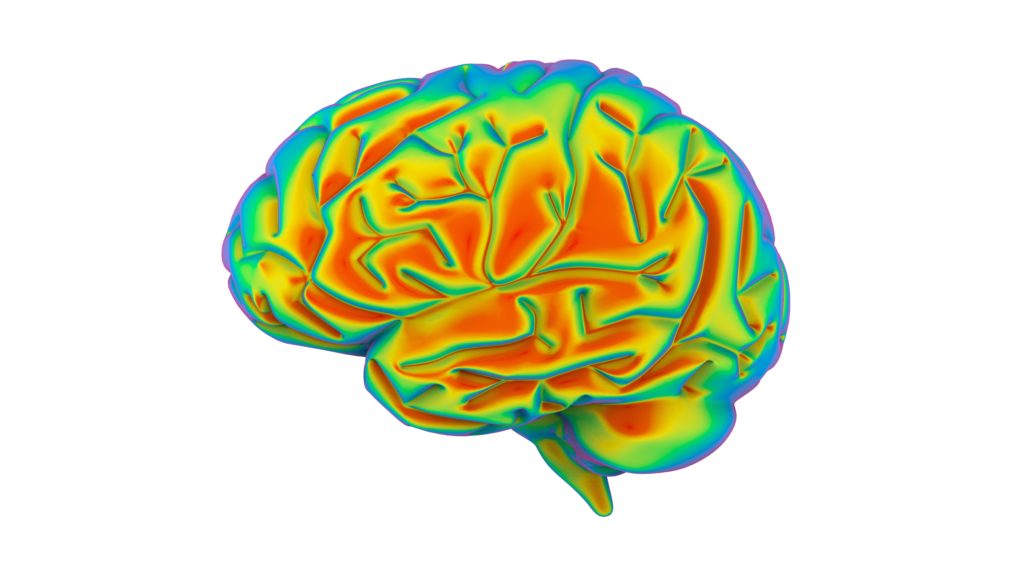Quick Hits
Daily brief research updates from the cognitive sciences

When we get sick we get a fever and we all know what our body temperature should be: around 37°C. Too much above that and we have a fever, and too much below and we risk undercooling.
What is the optimal temperature of the brain? We might assume that it is going to be around body temperature – after all internal temperature is precisely what we measure with thermometers. But the answer is we haven’t really known.
Researchers have measured brain temperature but often in patients undergoing surgery. New techniques have enabled more precise temperature measurements. However, there has been little done to measure the temperature over the course of a day and across demographics.
A group of researchers from Medical Research Council (MRC) Laboratory for Molecular Biology, in Cambridge has a led a large study to get a better grip on this with surprising results.
The Surprising Results
The surprising results are that average brain temperature was a hot 38.5°C enough to be classed as a fever in other parts. More surprising is that temperature in some regions at some times of day reached much higher temperatures with the highest measured as 40.9° – this would normally be considered a critical and dangerous fever!
These temperatures, however, vary by about 1°C over the day with warmest temperatures in the afternoon and coolest at night (unsurprising).
Variation is Critical
The more surprising insight was, however, in measuring temperatures of those in intensive care units. Here brain temperatures varied very strongly from a downright frigid 32.6°C to a scorching 42.6°C – this may be unsurprising, they were after all in critical conditions. But more surprising was that daily fluctuation of brain temperature in individuals predicted outcomes. Only 4% of those who had brain temperature fluctuations die whereas 27% of those without brain temperature fluctuation did.
Women Have Warmer Brains
That sound like an oversimplified statement and it is. But they did note that, in this study, women had average brain temperatures 0.4% higher. They also note that as one ages brain temperature also increases. This may be part of a natural ageing process.
So, all in, the brain seems to be a special organ with a, on average, higher temperature than other organs in the body – why this is so is open to speculation. This temperature varies between time of day, age, and sex, and daily temperature fluctuation seems to be a healthy indicator.
Thinking about that makes my brain feels like it’s running hot – I hope that’s a good sign●

Andy Habermacher
Andy is author of leading brains Review, Neuroleadership, and multiple other books. He has been intensively involved in writing and research into neuroleadership and is considered one of Europe’s leading experts. He is also a well-known public speaker speaking on the brain and human behaviour.
Andy is also a masters athlete (middle distance running) and competes regularly at international competitions (and holds a few national records in his age category).
Reference
Nina M Rzechorzek, Michael J Thrippleton, Francesca M Chappell, et al.
A daily temperature rhythm in the human brain predicts survival after brain injury.
Brain, 2022
DOI: 10.1093/brain/awab466
More Quick Hits
How Seven Habits Boost Brain Function and Lower Depression Risk
Different areas of the brain are associated with empathy – this new research shows how brain regions synchronise to induce empathic responses.
Diversity in Startup Teams Increases Survival In Changing Environments
Different areas of the brain are associated with empathy – this new research shows how brain regions synchronise to induce empathic responses.
All Work And No Play, Really Does Make Jack A Dull (and Ineffective) Boy
Different areas of the brain are associated with empathy – this new research shows how brain regions synchronise to induce empathic responses.
Do Conservatives and Liberals Have Moral Brains?
Different areas of the brain are associated with empathy – this new research shows how brain regions synchronise to induce empathic responses.
New Discovery: Swirling Spirals Move Across Your Brain
Different areas of the brain are associated with empathy – this new research shows how brain regions synchronise to induce empathic responses.
Zapping the Brain Improves Maths Ability
Different areas of the brain are associated with empathy – this new research shows how brain regions synchronise to induce empathic responses.






